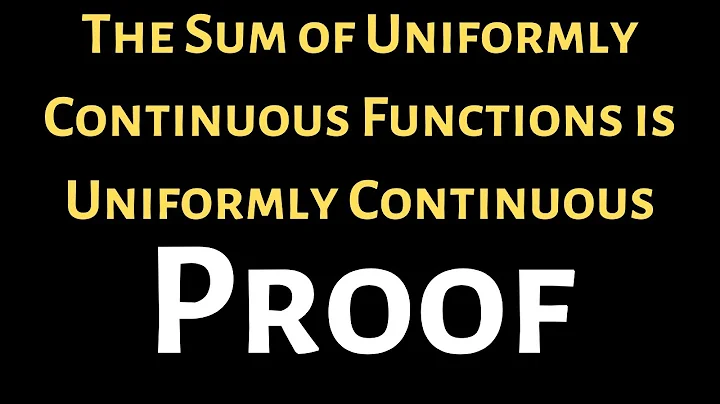If F and G Are Uniformly Continuous Prove Fg is Uniformly Continuous
If $f,g$ are uniformly continuous prove $f+g$ is uniformly continuous but $fg$ and $\dfrac{f}{g}$ are not
Solution 1
A product of uniformly continuous functions is not necessarily uniformly continuous. For example, set $E=\mathbb{R}$ and choose $f(x)=g(x)=x$. Their product, $x^2$, is an example of a nonuniformlycontinuous function.
Solution 2
Product $fg$
Boundnness is suffient but not necessary for uniform continuity of product $fg$.
Here is an example where $f,g$ both are unbounded but their product is uniformly continuous: Let $E=[0,\infty)$ and $f(x)=g(x)=\sqrt{x}$. Here $f$ and $g$ are unbounded but their product $(fg)(x)=x$ is uniformly continuous.
$\frac fg$:
It is not true that $\frac fg$ is always uniformly continuous. Let $E=[1,\infty)$,$f(x)=x$ and $g(x)=\frac{1}{x}$ then $\left(\frac fg\right)(x)=x^2$ is not uniformly continuous on $[1,\infty)$.
Solution 3
Yeah, but I think you're missing a step here:
$|f(x)g(x)-f(y)g(y)| \leq |g(x)||f(x)+f(y)|+|f(y)||g(x)+g(y)| $
I think you meant
$|f(x)g(x)-f(y)g(y)| = |f(x)g(x)-f(y)g(x)+f(y)g(x)-f(y)g(y)| \leq |g(x)||f(x)-f(y)|+|f(y)||g(x)-g(y)| \leq |g(x)||f(x)+f(y)|+|f(y)||g(x)+g(y)| $
or something like that?
Solution 4
As BCLC noted, how you got $$|f(x)g(x)-f(y)g(y)| \leq |g(x)||f(x)+f(y)|+|f(y)||g(x)+g(y)|$$ wasn't very clear. For the case $\frac{f}{g}$, you could note that $$\frac{f}{g} = f \cdot \frac{1}{g}$$ and use the previous part.
Related videos on Youtube
Comments
-
Suppose $f:\mathbb{R} \supset E \rightarrow \mathbb{R}$ and $g: \mathbb{R} \supset E \rightarrow \mathbb{R}$ are uniformly continuous. Show that $f+g$ is uniformly continuous. What about $fg$ and $\dfrac{f}{g}$?
My Attempt
Firstly let's state the definition; a function is uniformly continuous if
$$\forall \varepsilon >0\ \ \exists \ \ \delta >0 \ \ \text{such that} \ \ |f(x)-f(y)|< \varepsilon \ \ \forall \ \ x,y \in \mathbb{R} \ \ \text{such that} \ \ |x-y|<\delta$$Sum $f+g$
Now to to prove $f+g$ is uniformly continuous;
$\bullet$ Choose $\delta_1 >0$ such that $\forall$ $x,y \in \mathbb{R}$ $|x-y|<\delta_1$ $\implies$ $|f(x)-f(y)|< \dfrac{\epsilon}{2}$$\bullet$ Choose $\delta_2 >0$ such that $\forall$ $x,y \in \mathbb{R}$ $|x-y|<\delta_2$ $\implies$ $|g(x)-g(y)|< \dfrac{\varepsilon}{2}$
$\bullet$ Now take $\delta := min\{ \delta_1, \delta_2\}$ Then we obtain for all $x,y \in \mathbb{R}$ $$ |x-y|<\delta \implies |f(x)+g(x)-f(y)+g(y)| < |f(x)-f(y)| + |g(x)-g(y)| < \dfrac{\varepsilon}{2}+\dfrac{\varepsilon}{2}= \varepsilon$$
Product $fg$
Now for $fg$ for this to hold both $f:E \rightarrow \mathbb{R}$ and $g:E \rightarrow \mathbb{R}$ must be bounded , if not it doesn't hold. $\bullet$ $\exists \ \ M>0 \ \ such \ that \ \ |f(x)|<M \ \ and \ \ |g(x)|<M \ \ \forall \ x \in E$
$\bullet$ Choose $\delta_1 >0$ such that $\forall$ $x,y \in \mathbb{R}$ $|x-y|<\delta_1$ $\implies$ $|f(x)-f(y)|< \dfrac{\epsilon}{2M}$
$\bullet$ Choose $\delta_2 >0$ such that $\forall$ $x,y \in \mathbb{R}$ $|x-y|<\delta_2$ $\implies$ $|g(x)-g(y)|< \dfrac{\epsilon}{2M}$
$\bullet$ Now take $\delta := min\{ \delta_1, \delta_2\}$. Then, $|x-y|<\delta$ implies for all $x,y \in \mathbb{R}$, that $$|f(x)g(x)-f(y)g(y)| \leq |g(x)||f(x)+f(y)|+|f(y)||g(x)+g(y)| \leq $$ $$ M|f(x)+f(y)| + M|g(x)+g(y)| < M \dfrac{\epsilon}{2M} + M \dfrac{\epsilon}{2M} = \epsilon$$
Are these proofs correct? I am not sure how to approach the $\dfrac{f}{g}$ case.
-
The proof for $f+g$ is correct. Neither $fg$ nor $f/g$ are uniformly continuous in general.
-
Your proof for the product fg is almost correct. You only missed one point.In the definition of bounded function, M can be 0 (example the constant function 0 is bounded by 0). If $M = 0, f = g = 0$ and the function $f(x)g(x) = 0$ is uniformly continuous. Then you can divide by $M$, assuming that $M \neq 0$. It is a suttle point, but important one. But anyway if 0 is the upper bound, we can find another M' = M + 1 such that is also an upper bound and your proof is correct.
-
I think you mean if the functions $f$ and $g$ are continuous in a certain point $a \in \mathbb R$. This rigorous way of defining things gives you a clear idea on how to prove the statement in much finer detail.
-
@ViktorGlombik: the proof in linked answer deals with closed and bounded intervals which imply that functions involved are bounded. One loses uniform continuity in case one deals with unbounded functions.
-
-
I think you want minuses where you have $f(x) + f(y)$ and so on.
-
@DanZimm Ah thanks. Is it okay now?
-
assuming fg is uniformly continuous?
-
so under what condition $f/g$ is uniformly continuous?
Recents
What is the matrix and directed graph corresponding to the relation $\{(1, 1), (2, 2), (3, 3), (4, 4), (4, 3), (4, 1), (3, 2), (3, 1)\}$?
Related
Source: https://9to5science.com/if-f-g-are-uniformly-continuous-prove-f-g-is-uniformly-continuous-but-fg-and-dfrac-f-g-are-not





0 Response to "If F and G Are Uniformly Continuous Prove Fg is Uniformly Continuous"
Post a Comment